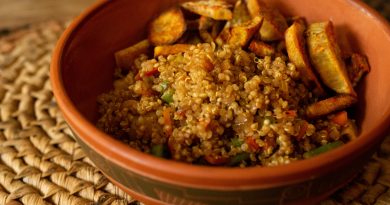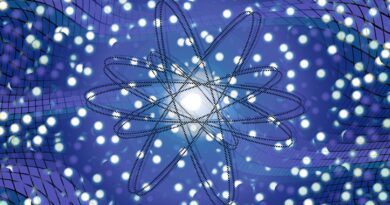Crédito da Imagem: Sigmund on Unsplash
Existem cerca de 7.000 idiomas falados em todo o mundo – e todos eles têm diferentes sons, vocabulários e estruturas. Mas eles moldam a maneira como pensamos? A cientista cognitiva Lera Boroditsky compartilha exemplos de linguagem – de uma comunidade aborígine na Austrália que usa direções cardeais em vez de esquerda e direita para as várias palavras para azul em russo – que sugerem que a resposta é um sonoro sim. “A beleza da diversidade linguística é que ela nos revela o quão engenhosa e flexível é a mente humana”, diz Boroditsky. “As mentes humanas não inventaram um universo cognitivo, mas 7.000.” (Fonte: TED.COM)
| Audio | |
|---|---|
Normal | Slow |
| English Transcript | Tradução |
| So, I'll be speaking to you using language ... because I can. | Falarei com vocês por meio de uma linguagem, porque tenho essa capacidade. |
| This is one these magical abilities that we humans have. | Esta é uma das habilidades mágicas do ser humano. |
| We can transmit really complicated thoughts to one another. | Podemos transmitir pensamentos realmente complexos entre nós. |
| So what I'm doing right now is, I'm making sounds with my mouth as I'm exhaling. | Neste exato momento, estou fazendo sons com minha boca conforme expiro. |
| I'm making tones and hisses and puffs, and those are creating air vibrations in the air. | Estou fazendo sons, assobios e sopros, que estão criando vibrações no ar. |
| Those air vibrations are traveling to you, they're hitting your eardrums, and then your brain takes those vibrations from your eardrums and transforms them into thoughts. | Essas vibrações viajam até vocês e chegam a seus tímpanos, então o cérebro pega essas vibrações dos tímpanos e as transforma em pensamentos. |
| I hope. | Assim espero. |
| I hope that's happening. | Espero que seja assim. |
| So because of this ability, we humans are able to transmit our ideas across vast reaches of space and time. | Por causa dessa capacidade, nós, humanos, conseguimos transmitir nossas ideias por enormes distâncias de espaço e tempo. |
| We're able to transmit knowledge across minds. | Somos capazes de transmitir conhecimento entre mentes. |
| I can put a bizarre new idea in your mind right now. | Posso colocar uma nova ideia bizarra em sua mente neste momento. |
| I could say, "Imagine a jellyfish waltzing in a library while thinking about quantum mechanics." | Eu poderia dizer: "Imaginem uma água-viva dançando valsa em uma biblioteca enquanto pensa sobre a mecânica quântica". |
| Now, if everything has gone relatively well in your life so far, you probably haven't had that thought before. | Se tudo vai relativamente bem em sua vida até agora, talvez vocês não tenham pensado nisso antes. |
| But now I've just made you think it, through language. | Mas acabei de fazê-los pensar nisso por meio da linguagem. |
| Now of course, there isn't just one language in the world, there are about 7,000 languages spoken around the world. | Claro que não há só um idioma no mundo, há cerca de 7 mil idiomas falados em todo o mundo. |
| And all the languages differ from one another in all kinds of ways. | Todos eles são diferentes entre si das mais diversas formas. |
| Some languages have different sounds, they have different vocabularies, and they also have different structures -- very importantly, different structures. | Alguns idiomas têm sons e vocabulários diferentes, e também estruturas diferentes, o que é muito importante. |
| That begs the question: Does the language we speak shape the way we think? | Isso leva à questão: a linguagem que falamos modela a maneira como nós pensamos? |
| Now, this is an ancient question. | Essa é uma questão antiga. |
| People have been speculating about this question forever. | Especula-se sobre isso eternamente. |
| Charlemagne, Holy Roman emperor, said, "To have a second language is to have a second soul" -- strong statement that language crafts reality. | Carlos Magno, o imperador romano, disse: "Ter um segundo idioma é ter uma segunda alma", uma forte afirmação de que a linguagem cria a realidade. |
| But on the other hand, Shakespeare has Juliet say, "What's in a name? A rose by any other name would smell as sweet." | Mas, por outro lado, Julieta, de Shakespeare, diz: "O que há em um nome? Uma rosa teria um cheiro agradável com qualquer outro nome". |
| Well, that suggests that maybe language doesn't craft reality. | Isso sugere que talvez a linguagem não crie a realidade. |
| These arguments have gone back and forth for thousands of years. | Esses argumentos vão e voltam há milhares de anos. |
| But until recently, there hasn't been any data to help us decide either way. | Mas até recentemente não havia dados para nos ajudar a decidir. |
| Recently, in my lab and other labs around the world, we've started doing research, and now we have actual scientific data to weigh in on this question. | Em meu laboratório e em outros ao redor do mundo, iniciamos pesquisas e temos agora dados científicos reais para embasar essa questão. |
| So let me tell you about some of my favorite examples. | Vou lhes contar alguns de meus exemplos favoritos. |
| I'll start with an example from an Aboriginal community in Australia that I had the chance to work with. | Começarei com um exemplo de uma comunidade aborígene da Austrália com a qual trabalhei. |
| These are the Kuuk Thaayorre people. | Esse é o povo Kuuk Thaayorre, que vive em Pormpuraaw, na margem do extremo oeste de Cabo York. |
| They live in Pormpuraaw at the very west edge of Cape York. | O legal sobre os Kuuk Thaayorre é que eles não usam palavras como "esquerda" e "direita". |
| What's cool about Kuuk Thaayorre is, in Kuuk Thaayorre, they don't use words like "left" and "right," and instead, everything is in cardinal directions: north, south, east and west. | Em vez disso, tudo é expresso em pontos cardeais: Norte, Sul, Leste e Oeste. |
| And when I say everything, I really mean everything. | Quando digo tudo, quero dizer realmente tudo. |
| You would say something like, "Oh, there's an ant on your southwest leg." | Diríamos algo como: "Ah, tem uma formiga na sua perna ao sudoeste". |
| Or, "Move your cup to the north-northeast a little bit." | Ou: "Mexa a sua xícara um pouquinho para o norte-nordeste". |
| In fact, the way that you say "hello" in Kuuk Thaayorre is you say, "Which way are you going?" | Na verdade, o modo como você diz "Olá" em Kuuk Thaayorre é: "Para onde você vai?" |
| And the answer should be, "North-northeast in the far distance. How about you?" | A resposta deveria ser: "Norte-Nordeste, no lado de lá, e você? |
| So imagine as you're walking around your day, every person you greet, you have to report your heading direction. | Imaginem que, conforme caminhamos por aí durante o dia, à cada pessoa que cumprimentamos, temos que dizer para onde estamos indo. |
| But that would actually get you oriented pretty fast, right? | Mas isso realmente nos orientaria muito rápido, não é mesmo? |
| Because you literally couldn't get past "hello," if you didn't know which way you were going. | Porque não conseguiríamos passar do "olá", se não soubéssemos para onde estamos indo. |
| In fact, people who speak languages like this stay oriented really well. | Os falantes de idiomas como esse têm uma orientação muito boa. |
| They stay oriented better than we used to think humans could. | Eles se orientam melhor do que pensávamos que os seres humanos poderiam se orientar. |
| We used to think that humans were worse than other creatures because of some biological excuse: "Oh, we don't have magnets in our beaks or in our scales." | Nós considerávamos os humanos piores do que as outras criaturas devido a alguma desculpa biológica: "Ah, não temos bússolas no bico ou nas escamas como eles". |
| No; if your language and your culture trains you to do it, actually, you can do it. | Não; se o idioma ou a cultura te treinar a fazer isso, então você consegue. |
| There are humans around the world who stay oriented really well. | Há seres humanos ao redor do mundo que se orientam muito bem. |
| And just to get us in agreement about how different this is from the way we do it, I want you all to close your eyes for a second and point southeast. | Só para entrarmos em acordo sobre como isso é diferente da maneira como fazemos, quero que todos fechem os olhos por um momento e apontem para o sudeste. |
| Keep your eyes closed. | Mantenham seus olhos fechados. |
| Point. | Apontem. |
| OK, so you can open your eyes. | Está bem, agora podem abrir os olhos. |
| I see you guys pointing there, there, there, there, there . | Vejo vocês apontando pra lá, pra cá, aqui, ali, acolá. |
| I don't know which way it is myself -- You have not been a lot of help. | Eu mesma não sei onde fica -- vocês não ajudaram muito. |
| So let's just say the accuracy in this room was not very high. | O nível de precisão neste auditório não foi muito alto. |
| This is a big difference in cognitive ability across languages, right? | Há uma grande diferença na capacidade cognitiva entre os idiomas, certo? |
| Where one group -- very distinguished group like you guys -- doesn't know which way is which, but in another group, I could ask a five-year-old and they would know. | Um grupo de pessoas distintas como vocês não conhece o caminho, mas, em outro grupo, eu poderia perguntar a uma criança de cinco anos e ela saberia. |
| There are also really big differences in how people think about time. | Há também diferenças muito grandes em como as pessoas pensam sobre o tempo. |
| So here I have pictures of my grandfather at different ages. | Tenho aqui fotos de meu avô em idades diferentes. |
| And if I ask an English speaker to organize time, they might lay it out this way, from left to right. | Se eu pedisse para um falante de inglês organizar o tempo, ele faria desta forma: da esquerda para a direita. |
| This has to do with writing direction. | Isso tem a ver com o sentido da escrita. |
| If you were a speaker of Hebrew or Arabic, you might do it going in the opposite direction, from right to left. | Falantes de hebraico ou árabe fariam isso no sentido oposto: da direita para a esquerda. |
| But how would the Kuuk Thaayorre, this Aboriginal group I just told you about, do it? | Mas como faria o Kuuk Thaayorre, o grupo aborígene que mencionei há pouco? |
| They don't use words like "left" and "right." | Eles não usam palavras como "direita" e "esquerda". |
| Let me give you hint. | Deixe-me dar-lhes uma pista. |
| When we sat people facing south, they organized time from left to right. | Quando as pessoas estão sentadas de frente para o sul, elas organizam o tempo da esquerda para a direita. |
| When we sat them facing north, they organized time from right to left. | Quando estão sentadas de frente para o norte, elas organizam o tempo da direita para a esquerda. |
| When we sat them facing east, time came towards the body. | Quando estão de frente para o leste, o tempo vem em direção ao corpo. |
| What's the pattern? | Qual é o padrão? |
| East to west, right? | Leste para oeste, não é mesmo? |
| So for them, time doesn't actually get locked on the body at all, it gets locked on the landscape. | Para elas, o tempo não fica preso ao corpo de forma alguma, fica preso à paisagem. |
| So for me, if I'm facing this way, then time goes this way, and if I'm facing this way, then time goes this way. | Para mim, se estou de frente pra cá, o tempo vai por aqui; se estou de frente pra cá, o tempo vai por aqui; eu de frente pra cá, o tempo vai por aqui. |
| I'm facing this way, time goes this way -- very egocentric of me to have the direction of time chase me around every time I turn my body. | É muito egocêntrico de minha parte ter o sentido do tempo me perseguindo toda vez que viro meu corpo. |
| For the Kuuk Thaayorre, time is locked on the landscape. | Para os Kuuk Thaayorre, o tempo está preso à paisagem. |
| It's a dramatically different way of thinking about time. | É um modo radicalmente diferente de pensar sobre o tempo. |
| Here's another really smart human trick. | Esta é uma outra habilidade humana muito inteligente. |
| Suppose I ask you how many penguins are there. | Vamos supor que eu pergunte quantos pinguins tem aqui. |
| Well, I bet I know how you'd solve that problem if you solved it. | Aposto que sei como resolveriam o problema, caso o fizessem. |
| You went, "One, two, three, four, five, six, seven, eight." | Vocês contariam assim: "Um, dois, três, quatro, cinco, seis, sete, oito". |
| You counted them. | Vocês os contaram. |
| You named each one with a number, and the last number you said was the number of penguins. | Atribuímos um número a cada um deles, e o último será a quantidade de pinguins. |
| This is a little trick that you're taught to use as kids. | ESte é um pequeno truque que aprendemos a usar quando crianças. |
| You learn the number list and you learn how to apply it. | Aprendemos uma lista de números e como aplicá-la. |
| A little linguistic trick. | Um pequeno truque linguístico. |
| Well, some languages don't do this, because some languages don't have exact number words. | Há idiomas que não fazem isso, porque alguns deles não têm palavras definidas para números. |
| They're languages that don't have a word like "seven" or a word like "eight." | São idiomas que não têm uma palavra como "sete", ou uma palavra como "oito". |
| In fact, people who speak these languages don't count, and they have trouble keeping track of exact quantities. | De fato, as pessoas que falam esses idiomas não contam e têm problemas em identificar quantidades exatas. |
| So, for example, if I ask you to match this number of penguins to the same number of ducks, you would be able to do that by counting. | Se eu pedisse a vocês, por exemplo, para associar essa quantidade de pinguins à mesma quantidade de patos, vocês seriam capazes de fazer isso contando. |
| But folks who don't have that linguistic trick can't do that. | Mas as pessoas que não têm essa habilidade linguística não conseguem fazer isso. |
| Languages also differ in how they divide up the color spectrum -- the visual world. | Os idiomas também diferem no modo como dividem o espectro de cores, o mundo visual. |
| Some languages have lots of words for colors, some have only a couple words, "light" and "dark." | Alguns idiomas têm muitas palavras para cores; outros têm apenas duas: "claro" e "escuro". |
| And languages differ in where they put boundaries between colors. | Há idiomas que diferem em onde colocam os limites entre as cores. |
| So, for example, in English, there's a word for blue that covers all of the colors that you can see on the screen, but in Russian, there isn't a single word. | Em inglês, por exemplo, há uma palavra para azul que abrange todas as cores que podemos ver na tela, mas, em russo, não há uma palavra única. |
| Instead, Russian speakers have to differentiate between light blue, "goluboy," and dark blue, "siniy." | Em vez disso, falantes de russo diferenciam o azul claro, "goluboy", do azul escuro, "siniy". |
| So Russians have this lifetime of experience of, in language, distinguishing these two colors. | Os russos têm uma vida de experiência distinguindo essas duas cores no idioma. |
| When we test people's ability to perceptually discriminate these colors, what we find is that Russian speakers are faster across this linguistic boundary. | Quando testamos a capacidade das pessoas de distinguir essas cores, descobrimos que os falantes de russo são mais rápidos nesse limite linguístico. |
| They're faster to be able to tell the difference between a light and dark blue. | São mais rápidos em dizer a diferença entre o azul claro e o escuro. |
| And when you look at people's brains as they're looking at colors -- say you have colors shifting slowly from light to dark blue -- the brains of people who use different words for light and dark blue will give a surprised reaction as the colors shift from light to dark, as if, "Ooh, something has categorically changed," whereas the brains of English speakers, for example, that don't make this categorical distinction, don't give that surprise, because nothing is categorically changing. | Quando examinamos o cérebro das pessoas ao observarem as cores -- digamos que temos cores cores mudando lentamente do azul claro para o escuro -- o cérebro das pessoas que usam palavras diferentes para azul claro e azul escuro mostrará uma reação de surpresa conforme as cores mudam, como: "Algo claramente mudou", enquanto o cérebro de falantes de inglês, que não fazem essa distinção explícita, não tem essa reação, porque nada mudou claramente. |
| Languages have all kinds of structural quirks. | Os idiomas têm todos os tipos de peculiaridades estruturais. |
| This is one of my favorites. | Este é um de meus favoritos. |
| Lots of languages have grammatical gender; every noun gets assigned a gender, often masculine or feminine. | Muitos idiomas têm gêneros gramaticais; a cada substantivo é atribuído um gênero, muitas vezes masculino ou feminino. |
| And these genders differ across languages. | Os gêneros são diferentes nos idiomas. |
| So, for example, the sun is feminine in German but masculine in Spanish, and the moon, the reverse. | Por exemplo, o Sol é feminino em alemão, mas masculino em espanhol, e a Lua, o contrário. |
| Could this actually have any consequence for how people think? | Isso poderia mesmo ter consequências na maneira como as pessoas pensam? |
| Do German speakers think of the sun as somehow more female-like, and the moon somehow more male-like? | Os falantes de alemão pensam no Sol como se fosse mais feminino, e a Lua como se fosse mais masculino? |
| Actually, it turns out that's the case. | É o que realmente acontece. |
| So if you ask German and Spanish speakers to, say, describe a bridge, like the one here -- "bridge" happens to be grammatically feminine in German, grammatically masculine in Spanish -- German speakers are more likely to say bridges are "beautiful," "elegant" and stereotypically feminine words. | Se pedirmos a falantes de alemão e de espanhol para descrever uma ponte, como esta aqui, acontece que a palavra "ponte" é gramaticalmente feminina em alemão e gramaticalmente masculina em espanhol -- é mais provável que falantes de alemão digam que as pontes são "bonitas", "elegantes", e usem palavras de natureza feminina. |
| Whereas Spanish speakers will be more likely to say they're "strong" or "long," these masculine words. | Por sua vez, falantes de espanhol talvez digam que elas são "fortes" ou "extensas", palavras de natureza masculina. |
| Languages also differ in how they describe events, right? | Os idiomas também se diferenciam no modo como descrevem os eventos, certo? |
| You take an event like this, an accident. | Consideremos um evento como este, um acidente. |
| In English, it's fine to say, "He broke the vase." | Em inglês, está certo dizer: "Ele quebrou o vaso". |
| In a language like Spanish, you might be more likely to say, "The vase broke," or, "The vase broke itself. | Em um idioma como o espanhol, é mais provável dizer: "O vaso quebrou" ou "O vaso se quebrou". |
| If it's an accident, you wouldn't say that someone did it. | Se for um acidente, não diremos que foi causado por alguém. |
| In English, quite weirdly, we can even say things like, "I broke my arm." | Em inglês, de modo estranho, podemos até dizer coisas do tipo: "Quebrei meu braço". |
| Now, in lots of languages, you couldn't use that construction unless you are a lunatic and you went out looking to break your arm -- and you succeeded. | Em muitos idiomas, não se pode usar essa construção a menos que você seja maluco e saia por aí pensando em quebrar seu braço e consiga fazer isso. |
| If it was an accident, you would use a different construction. | Se fosse um acidente, usaríamos uma construção diferente. |
| Now, this has consequences. | Mas isso tem consequências. |
| So, people who speak different languages will pay attention to different things, depending on what their language usually requires them to do. | As pessoas que falam vários idiomas prestarão atenção em coisas diferentes, dependendo do que o idioma lhes peça para fazer. |
| So we show the same accident to English speakers and Spanish speakers, English speakers will remember who did it, because English requires you to say, "He did it; he broke the vase." | Então, mostramos o mesmo acidente a falantes de inglês e de espanhol, os falantes de inglês se lembrarão de quem o causou, porque o idioma inglês exige que se diga: "Ele fez isso; ele quebrou o vaso". |
| Whereas Spanish speakers might be less likely to remember who did it if it's an accident, but they're more likely to remember that it was an accident. | Os falantes de espanhol podem não se lembrar de quem o quebrou se foi um acidente, mas é mais provável que se lembrem de que foi um acidente. |
| They're more likely to remember the intention. | É mais provável que se lembrem da intenção. |
| So, two people watch the same event, witness the same crime, but end up remembering different things about that event. | Então, duas pessoas presenciam o mesmo evento, testemunham o mesmo crime, mas acabam se lembrando de coisas diferentes sobre esse evento. |
| This has implications, of course, for eyewitness testimony. | Isso tem implicações, é claro, para o testemunho ocular. |
| It also has implications for blame and punishment. | Também tem implicações para a culpa e a punição. |
| So if you take English speakers and I just show you someone breaking a vase, and I say, "He broke the vase," as opposed to "The vase broke," even though you can witness it yourself, you can watch the video, you can watch the crime against the vase, you will punish someone more, you will blame someone more if I just said, "He broke it," as opposed to, "It broke." | Se considerarmos falantes de inglês, e eu mostrar a eles alguém quebrando um vaso, e disser: "Ele quebrou o vaso", em vez de dizer: "O vaso quebrou", mesmo que vocês possam testemunhar, assistir ao vídeo, assistir ao crime contra o vaso, vocês punirão mais alguém, culparão mais alguém se eu disser apenas: "Ele o quebrou", em vez de: "Quebrou". |
| The language guides our reasoning about events. | A linguagem guia nosso raciocínio sobre os eventos. |
| Now, I've given you a few examples of how language can profoundly shape the way we think, and it does so in a variety of ways. | Vou dar alguns exemplos de como a linguagem pode moldar profundamente a maneira como pensamos, e ela faz isso de várias maneiras. |
| So language can have big effects, like we saw with space and time, where people can lay out space and time in completely different coordinate frames from each other. | A linguagem pode ter grandes efeitos, como vimos com o espaço e o tempo, em que podemos dispor o espaço e o tempo em coordenadas completamente diferentes entre si. |
| Language can also have really deep effects -- that's what we saw with the case of number. | A linguagem também pode ter efeitos muito profundos, como vimos no caso dos números. |
| Having count words in your language, having number words, opens up the whole world of mathematics. | Ter palavras para contar em seu idioma, palavras para números, abre todo o mundo da matemática. |
| Of course, if you don't count, you can't do algebra, you can't do any of the things that would be required to build a room like this or make this broadcast, right? | Claro, se não contamos, não podemos fazer álgebra, não podemos fazer nenhuma das coisas necessárias para construir um auditório como este, ou fazer esta transmissão, certo? |
| This little trick of number words gives you a stepping stone into a whole cognitive realm. | Essa pequena habilidade com números é o ponto de partida para um completo mundo cognitivo. |
| Language can also have really early effects, what we saw in the case of color. | A linguagem também pode ter efeitos muito antecipados, como vimos no caso das cores. |
| These are really simple, basic, perceptual decisions. | São decisões muito simples, básicas e perceptivas. |
| We make thousands of them all the time, and yet, language is getting in there and fussing even with these tiny little perceptual decisions that we make. | Tomamos milhares de decisões o tempo todo, mas a linguagem se mete no meio, complicando até mesmo nossas pequenas decisões intuitivas. |
| Language can have really broad effects. | A linguagem pode ter efeitos muito amplos. |
| So the case of grammatical gender may be a little silly, but at the same time, grammatical gender applies to all nouns. | O caso do gênero gramatical pode ser um pouco bobo, mas, ao mesmo tempo, o gênero gramatical se aplica a todos os substantivos. |
| That means language can shape how you're thinking about anything that can be named by a noun. | Significa que a linguagem pode modelar como pensamos sobre qualquer coisa que podemos chamar por um substantivo. |
| That's a lot of stuff. | É muita coisa. |
| And finally, I gave you an example of how language can shape things that have personal weight to us -- ideas like blame and punishment or eyewitness memory. | Finalmente, vou dar um exemplo de como a linguagem pode modelar coisas de importância pessoal para nós, ideias como culpa, punição, ou memória de testemunha ocular. |
| These are important things in our daily lives. | Estas são coisas importantes em nossa vida diária. |
| Now, the beauty of linguistic diversity is that it reveals to us just how ingenious and how flexible the human mind is. | A beleza da diversidade linguística é que ela revela para nós o quão genial e flexível a mente humana é. |
| Human minds have invented not one cognitive universe, but 7,000 -- there are 7,000 languages spoken around the world. | A mente humana não inventou apenas um universo cognitivo, mas 7 mil -- há 7 mil idiomas falados em todo o mundo. |
| And we can create many more -- languages, of course, are living things, things that we can hone and change to suit our needs. | E podemos criar muitos outros -- os idiomas, é claro, são coisas vivas, que podemos aprimorar e mudar para adaptá-los às nossas necessidades. |
| The tragic thing is that we're losing so much of this linguistic diversity all the time. | O trágico é que estamos perdendo tanto desta diversidade linguística o tempo todo. |
| We're losing about one language a week, and by some estimates, half of the world's languages will be gone in the next hundred years. | Perdemos cerca de um idioma por semana, e, segundo algumas estimativas, metade dos idiomas do mundo desaparecerá nos próximos 100 anos. |
| And the even worse news is that right now, almost everything we know about the human mind and human brain is based on studies of usually American English-speaking undergraduates at universities. | Pior ainda é que, neste exato momento, quase tudo o que conhecemos sobre a mente e o cérebro humano é geralmente baseado em estudos de alunos falantes de inglês americano nas universidades. |
| That excludes almost all humans. | Isso exclui quase todos. |
| Right? | Certo? |
| So what we know about the human mind is actually incredibly narrow and biased, and our science has to do better. | O que conhecemos sobre a mente humana é incrivelmente limitado e tendencioso, e nossa ciência precisa melhorar. |
| I want to leave you with this final thought. | Quero deixar este último pensamento com vocês. |
| I've told you about how speakers of different languages think differently, but of course, that's not about how people elsewhere think. | Mostrei como falantes de diferentes idiomas pensam diferente, mas não se trata de como as pessoas de outros lugares pensam. |
| It's about how you think. | Trata-se de como nós pensamos. |
| It's how the language that you speak shapes the way that you think. | Trata-se de como a linguagem que falamos modela a maneira como nós pensamos. |
| And that gives you the opportunity to ask, "Why do I think the way that I do?" "How could I think differently?" | Isso nos dá a oportunidade de perguntar: "Por que penso dessa maneira?" "Como poderia pensar de modo diferente?" |
| And also, "What thoughts do I wish to create?" | E também: "Quais pensamentos desejo criar?" |
| Thank you very much. | Muito obrigada. |
| Tradução: Maurício Kakuei Tanaka | |
| Revisão: Maricene Crus | |
Contagem de palavras
A tabela abaixo exibe as palavras encontradas neste vídeo bem como o número de vezes em que aparecem.
Veja também: Para que serve esta tabela?
| Freq. | Palavra | Freq. | Palavra | Freq. | Palavra |
|---|---|---|---|---|---|
| 83 | the | 70 | you | 61 | to |
| 60 | and | 49 | of | 47 | in |
| 39 | that | 39 | a | 34 | this |
| 32 | have | 30 | I | 27 | we |
| 25 | so | 24 | it | 24 | is |
| 23 | language | 22 | languages | 21 | can |
| 20 | how | 19 | way | 19 | time |
| 19 | about | 17 | say | 17 | if |
| 17 | do | 17 | are | 16 | your |
| 16 | like | 15 | right | 15 | for |
| 14 | think | 14 | they | 14 | there |
| 14 | different | 14 | but | 13 | speakers |
| 12 | people | 12 | now | 12 | don't |
| 12 | be | 12 | an | 11 | words |
| 11 | these | 11 | one | 11 | from |
| 10 | really | 10 | number | 10 | more |
| 10 | english | 10 | as | 10 | all |
| 9 | with | 9 | or | 9 | on |
| 9 | broke | 8 | would | 8 | who |
| 8 | vase | 8 | things | 8 | some |
| 8 | just | 8 | has | 8 | colors |
| 8 | also | 7 | world | 7 | will |
| 7 | what | 7 | they're | 7 | them |
| 7 | spanish | 7 | our | 7 | my |
| 7 | know | 7 | I'm | 7 | because |
| 7 | at | 6 | when | 6 | well |
| 6 | very | 6 | use | 6 | thaayorre |
| 6 | little | 6 | likely | 6 | light |
| 6 | left | 6 | kuuk | 6 | it's |
| 6 | humans | 6 | human | 6 | facing |
| 6 | example | 6 | dark | 6 | blue |
| 6 | ask | 6 | around | 6 | actually |
| 6 | accident | 5 | which | 5 | trick |
| 5 | that's | 5 | speak | 5 | same |
| 5 | other | 5 | me | 5 | linguistic |
| 5 | he | 5 | german | 5 | everything |
| 5 | differ | 5 | course | 5 | could |
| 5 | across | 4 | word | 4 | was |
| 4 | us | 4 | someone | 4 | shape |
| 4 | remember | 4 | question | 4 | out |
| 4 | oriented | 4 | not | 4 | north |
| 4 | mind | 4 | might | 4 | masculine |
| 4 | make | 4 | group | 4 | get |
| 4 | gender | 4 | feminine | 4 | even |
| 4 | effects | 4 | direction | 4 | did |
| 4 | case | 4 | by | 4 | any |
| 4 | another | 4 | able | 3 | you're |
| 3 | whereas | 3 | where | 3 | what's |
| 3 | west | 3 | we're | 3 | were |
| 3 | watch | 3 | vibrations | 3 | up |
| 3 | two | 3 | transmit | 3 | thoughts |
| 3 | those | 3 | thinking | 3 | then |
| 3 | stay | 3 | space | 3 | second |
| 3 | saw | 3 | sat | 3 | said |
| 3 | russian | 3 | penguins | 3 | lots |
| 3 | locked | 3 | I've | 3 | grammatical |
| 3 | gone | 3 | going | 3 | goes |
| 3 | give | 3 | fact | 3 | eyes |
| 3 | every | 3 | event | 3 | east |
| 3 | doesn't | 3 | count | 3 | cognitive |
| 3 | can't | 3 | brains | 3 | body |
| 3 | blame | 3 | big | 3 | between |
| 3 | been | 3 | air | 3 | ability |
| 2 | years | 2 | worse | 2 | witness |
| 2 | whole | 2 | went | 2 | ways |
| 2 | want | 2 | usually | 2 | used |
| 2 | told | 2 | thousands | 2 | thought |
| 2 | there's | 2 | than | 2 | tell |
| 2 | take | 2 | sun | 2 | structures |
| 2 | strong | 2 | spoken | 2 | speaking |
| 2 | speaker | 2 | south | 2 | sounds |
| 2 | something | 2 | somehow | 2 | show |
| 2 | seven | 2 | see | 2 | room |
| 2 | requires | 2 | recently | 2 | reality |
| 2 | put | 2 | punishment | 2 | point |
| 2 | perceptual | 2 | people's | 2 | organized |
| 2 | opposed | 2 | oh | 2 | noun |
| 2 | northeast | 2 | named | 2 | name |
| 2 | much | 2 | moon | 2 | minds |
| 2 | many | 2 | making | 2 | lot |
| 2 | losing | 2 | looking | 2 | let |
| 2 | learn | 2 | lay | 2 | landscape |
| 2 | kinds | 2 | isn't | 2 | into |
| 2 | instead | 2 | implications | 2 | imagine |
| 2 | I'll | 2 | ideas | 2 | hope |
| 2 | here | 2 | help | 2 | hello |
| 2 | having | 2 | had | 2 | guys |
| 2 | grammatically | 2 | gives | 2 | gets |
| 2 | five | 2 | faster | 2 | far |
| 2 | eyewitness | 2 | examples | 2 | exact |
| 2 | events | 2 | eight | 2 | eardrums |
| 2 | each | 2 | doing | 2 | does |
| 2 | diversity | 2 | differently | 2 | difference |
| 2 | describe | 2 | decisions | 2 | data |
| 2 | crime | 2 | create | 2 | couldn't |
| 2 | construction | 2 | color | 2 | categorically |
| 2 | bridge | 2 | brain | 2 | better |
| 2 | arm | 2 | almost | 2 | aboriginal |
| 1 | yourself | 1 | you'd | 1 | york |
| 1 | yet | 1 | year | 1 | writing |
| 1 | wouldn't | 1 | world's | 1 | work |
| 1 | wish | 1 | why | 1 | while |
| 1 | we've | 1 | weirdly | 1 | weight |
| 1 | weigh | 1 | week | 1 | waltzing |
| 1 | walking | 1 | vocabularies | 1 | visual |
| 1 | video | 1 | vast | 1 | variety |
| 1 | using | 1 | until | 1 | unless |
| 1 | universities | 1 | universe | 1 | undergraduates |
| 1 | turns | 1 | turn | 1 | trouble |
| 1 | traveling | 1 | transforms | 1 | trains |
| 1 | tragic | 1 | track | 1 | towards |
| 1 | tones | 1 | tiny | 1 | through |
| 1 | three | 1 | though | 1 | thing |
| 1 | their | 1 | thank | 1 | testimony |
| 1 | test | 1 | taught | 1 | takes |
| 1 | sweet | 1 | surprised | 1 | surprise |
| 1 | suppose | 1 | suit | 1 | suggests |
| 1 | succeeded | 1 | stuff | 1 | studies |
| 1 | structural | 1 | stone | 1 | stereotypically |
| 1 | stepping | 1 | statement | 1 | started |
| 1 | start | 1 | speculating | 1 | spectrum |
| 1 | southwest | 1 | southeast | 1 | soul |
| 1 | solved | 1 | solve | 1 | smell |
| 1 | smart | 1 | slowly | 1 | six |
| 1 | siniy | 1 | single | 1 | simple |
| 1 | silly | 1 | should | 1 | shifting |
| 1 | shift | 1 | shapes | 1 | shakespeare |
| 1 | screen | 1 | scientific | 1 | science |
| 1 | scales | 1 | russians | 1 | rose |
| 1 | roman | 1 | reverse | 1 | reveals |
| 1 | research | 1 | required | 1 | report |
| 1 | remembering | 1 | relatively | 1 | reasoning |
| 1 | realm | 1 | reaction | 1 | reaches |
| 1 | quite | 1 | quirks | 1 | quantum |
| 1 | quantities | 1 | punish | 1 | puffs |
| 1 | profoundly | 1 | problem | 1 | probably |
| 1 | pretty | 1 | pormpuraaw | 1 | pointing |
| 1 | pictures | 1 | personal | 1 | person |
| 1 | perceptually | 1 | pay | 1 | pattern |
| 1 | past | 1 | organize | 1 | opposite |
| 1 | opportunity | 1 | opens | 1 | open |
| 1 | ooh | 1 | only | 1 | old |
| 1 | ok | 1 | often | 1 | nouns |
| 1 | nothing | 1 | no | 1 | next |
| 1 | news | 1 | new | 1 | needs |
| 1 | narrow | 1 | myself | 1 | move |
| 1 | mouth | 1 | memory | 1 | mechanics |
| 1 | means | 1 | mean | 1 | maybe |
| 1 | may | 1 | mathematics | 1 | match |
| 1 | male | 1 | magnets | 1 | magical |
| 1 | made | 1 | lunatic | 1 | look |
| 1 | long | 1 | living | 1 | lives |
| 1 | live | 1 | literally | 1 | list |
| 1 | lifetime | 1 | life | 1 | library |
| 1 | let's | 1 | less | 1 | leg |
| 1 | leave | 1 | last | 1 | labs |
| 1 | lab | 1 | knowledge | 1 | kids |
| 1 | keeping | 1 | keep | 1 | juliet |
| 1 | jellyfish | 1 | itself | 1 | invented |
| 1 | intention | 1 | ingenious | 1 | incredibly |
| 1 | importantly | 1 | important | 1 | idea |
| 1 | hundred | 1 | hone | 1 | holy |
| 1 | hitting | 1 | hisses | 1 | hint |
| 1 | high | 1 | here's | 1 | hebrew |
| 1 | heading | 1 | haven't | 1 | hasn't |
| 1 | happens | 1 | happening | 1 | hand |
| 1 | half | 1 | guides | 1 | greet |
| 1 | grandfather | 1 | goluboy | 1 | given |
| 1 | getting | 1 | genders | 1 | gave |
| 1 | fussing | 1 | frames | 1 | four |
| 1 | forth | 1 | forever | 1 | folks |
| 1 | flexible | 1 | fine | 1 | find |
| 1 | finally | 1 | final | 1 | few |
| 1 | female | 1 | favorites | 1 | favorite |
| 1 | fast | 1 | experience | 1 | exhaling |
| 1 | excuse | 1 | excludes | 1 | estimates |
| 1 | end | 1 | emperor | 1 | elsewhere |
| 1 | elegant | 1 | either | 1 | egocentric |
| 1 | edge | 1 | early | 1 | ducks |
| 1 | dramatically | 1 | divide | 1 | distinguishing |
| 1 | distinguished | 1 | distinction | 1 | distance |
| 1 | discriminate | 1 | directions | 1 | differentiate |
| 1 | differences | 1 | didn't | 1 | depending |
| 1 | deep | 1 | decide | 1 | day |
| 1 | daily | 1 | cup | 1 | culture |
| 1 | creatures | 1 | creating | 1 | crafts |
| 1 | craft | 1 | covers | 1 | couple |
| 1 | counting | 1 | counted | 1 | coordinate |
| 1 | cool | 1 | consequences | 1 | consequence |
| 1 | complicated | 1 | completely | 1 | community |
| 1 | closed | 1 | close | 1 | chase |
| 1 | charlemagne | 1 | changing | 1 | changed |
| 1 | change | 1 | chance | 1 | categorical |
| 1 | cardinal | 1 | cape | 1 | came |
| 1 | build | 1 | broadcast | 1 | broad |
| 1 | bridges | 1 | breaking | 1 | break |
| 1 | boundary | 1 | boundaries | 1 | bizarre |
| 1 | bit | 1 | biological | 1 | biased |
| 1 | bet | 1 | begs | 1 | before |
| 1 | beauty | 1 | beautiful | 1 | beaks |
| 1 | basic | 1 | based | 1 | back |
| 1 | australia | 1 | attention | 1 | assigned |
| 1 | arguments | 1 | arabic | 1 | apply |
| 1 | applies | 1 | anything | 1 | ant |
| 1 | answer | 1 | ancient | 1 | american |
| 1 | algebra | 1 | agreement | 1 | ages |
| 1 | against | 1 | actual | 1 | accuracy |
| 1 | abilities |









